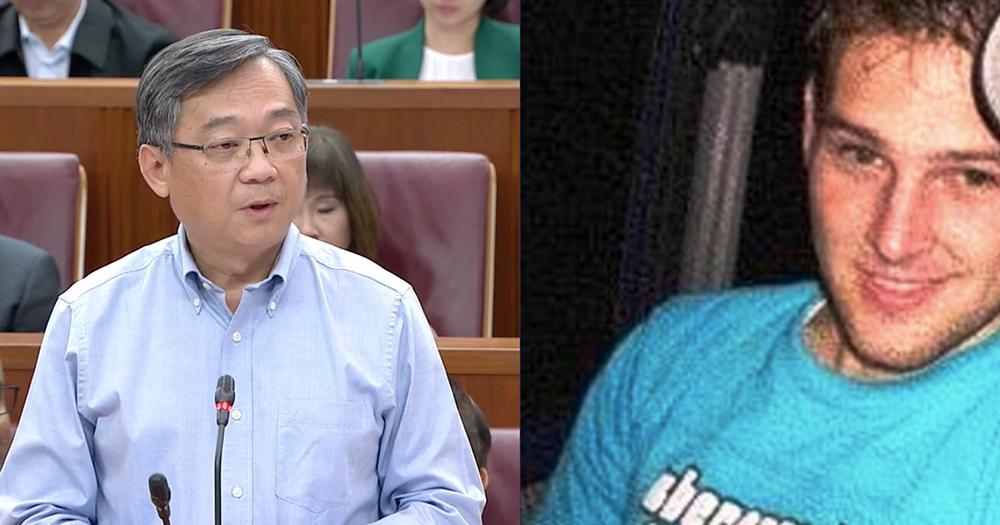Minister for Health Gan Kim Yong has apologised once more over the recent online leak of the details of 14,200 HIV-infected patients from the Ministry of Health’s registry (MOH).
Gan said he was sorry for the distress caused to people affected with HIV, by the "irresponsible actions" of Ler Teck Siang, the former head of the National Public Health Unit (NPHU).
He also added that Singapore would spare no effort in bringing Ler's lover, Mikhy K Farrera-Brochez, the man behind the leak to justice.
The apology was delivered as part of Gan's statement, on Feb. 12 in Parliament, in response to questions raised by several MPs on the incident.
These questions were along the lines of:
Why was the breach not disclosed earlier?
Gan stated that MOH was first made aware of the leak in 2016, when Brochez was arrested for repeatedly refusing MOH's order to take a blood test.
At that point, Brochez revealed to the government, the names and details of 75 people from the HIV registry, which led to MOH filing a police report on May 16, 2016.
On deciding whether to inform the public at that time about the HIV leak, Gan added that the decision was not a straightforward one.
This was because the need for transparency was weighed by MOH against the impact that an announcement would have on the affected people with HIV, and whether an announcement would serve or harm their interests.
Moreover, a key factor at that time, Gan highlighted:
"there was then still no evidence that the confidential information had been disseminated to the public."
Gan stated that as such, MOH decided, at that time, that the announcement would not serve the interests of those affected, due to the "anxiety and distress" they would experience.
Gan added that a similar decision was reached by MOH in 2018 when Brochez sent a screenshot of 31 names from the HIV registry to multiple government authorities, after being deported from Singapore,
In the second instance, MOH decided instead to contact the 31 affected people to alert them to the matter.
What were the actions taken against Brochez back then to ensure he did not have access to the data?
Gan stated that both Ler's and Brochez's premises were raided after the filing of the May 2016 report to seize and secure "all relevant materials":
"These included their computers and electronic storage devices containing files with confidential information from the HIV Registry, files related to hospital services and to other infectious diseases, as well as other information likely used by Ler for his work such as e-mails, HIV studies and reports".
Gan added that Brochez's email account was also searched, where it was discovered that, apart from government authorities, Brochez had further sent a screenshot and a PDF file of more names from the HIV registry to his mother.
The police stated that Brochez's mother, upon being contacted, agreed to let the police access her email and delete the records.
Gan acknowledged that there was a risk Brochez could have hidden away more information, despite the police seizing everything in Ler's and Brochez's possession.
As for why Brochez did not get charged the Official Secrets Act (OSA) back in 2016, Gan stated that the Attorney-General Court had decided not to do so as:
"they [had] assessed that he would likely be sentenced to a fine only, or at most a few weeks in jail. This was because there had been no wide dissemination of the information at that stage, and he had primarily used the information to complain to Government agencies"
Gan highlighted that Brochez was in fact facing far heavier penalties from his various fraud and drug-related charges.
This resulted in Brochez being issued with a stern warning for his offence under the OSA.
What is currently being done to help and protect the well-being of those whose data was leaked?
Gan stated that MOH has since contacted 2,400 out of the 3,500 Singaporeans who have been affected by the leak.
Additionally, medical social workers have:
"helped to first identify those likely to require more support, so that designated officers can exercise extra care and provide additional support when calling them."
Gan added that counsellors are also on standby for those in distress and require more support.
On the issue of insurance and protection from discrimination in employment , Gan stated:
"Agencies such as the Life Insurance Association (LIA), Ministry of Manpower (MOM) and Tripartite Alliance for Fair and Progressive Employment Practices (TAFEP) have provided public assurances on common concerns. MOM shared that Singapore has employment laws to protect employees from wrongful dismissals, including on the grounds of HIV. LIA has in turn assured policyholders that insurers that receive information related to this incident will not use such information. They will inform the relevant authorities immediately."
Should individuals have further concerns, they can contact MOH's hotline at 6325 9220.
Gan subsequently concluded his statement by calling for Singaporeans to respond to the incident with understanding and support:
"If we can say no to discrimination and reduce the stigma surrounding HIV, we can turn the harm and discord that the perpetrators seek to sow into a more inclusive and supportive environment for persons with HIV."
Top image collage left screenshot from CNA, right image from The Independent
If you like what you read, follow us on Facebook, Instagram, Twitter and Telegram to get the latest updates.
